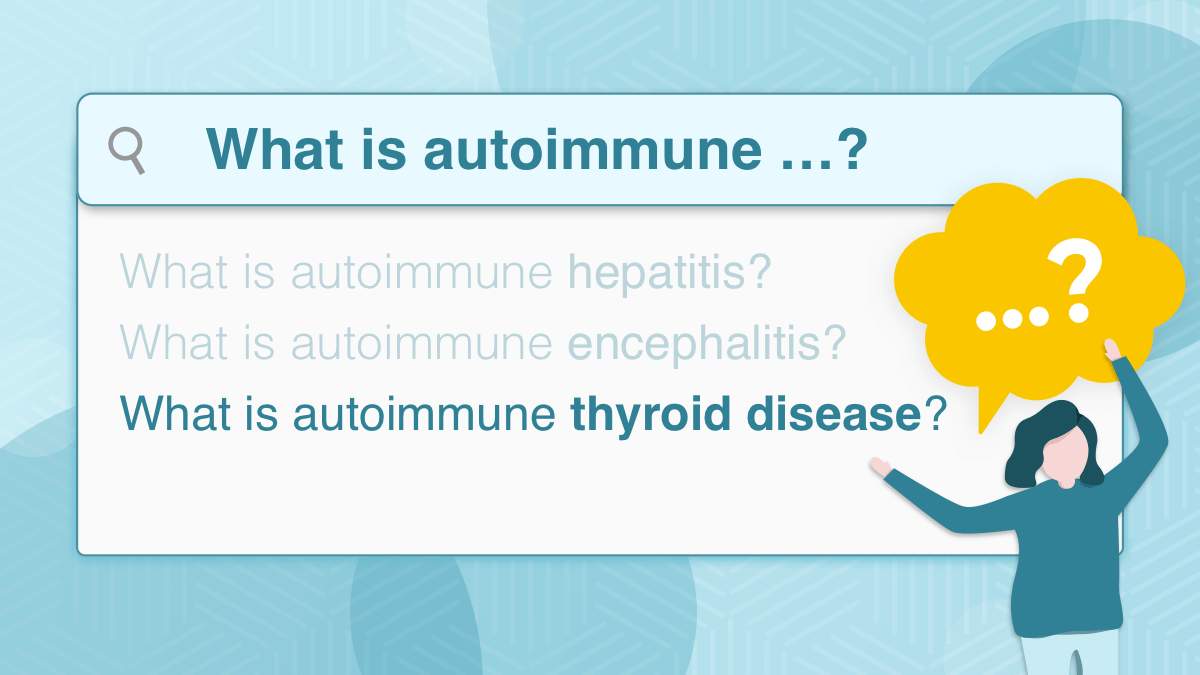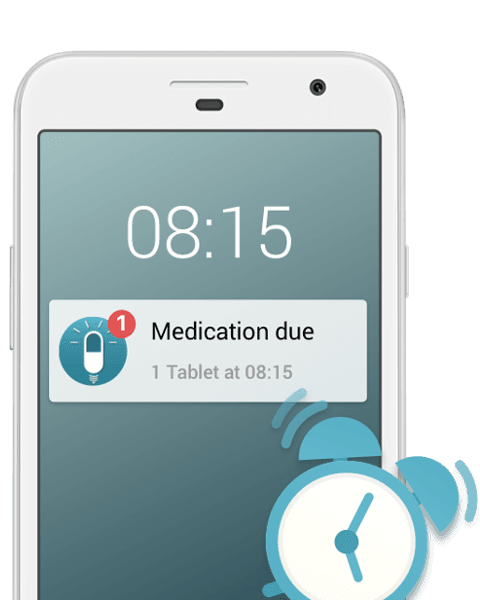Autoimmune diseases are complicated conditions. In this series, we take a look at three of the most commonly searched-for autoimmune diseases – autoimmune hepatitis, encephalitis, and thyroid disease – and explain the key points of each in simple, easy-to-understand language. In this article, we explain what autoimmune thyroid disease is.
Other articles in this series:
- Autoimmune Diseases Explained: Autoimmune Hepatitis
- Autoimmune Diseases Explained: Autoimmune Encephalitis
What is an Autoimmune Disease?
The immune system is your body’s defense against from viruses and infections. When such invaders (pathogens) are detected, several immune responses kick into gear and aim to destroy them and keep your body healthy.
Antibodies are made to fight the pathogens.
In an individual living with an autoimmune disease, autoantibodies are produced and attack the body’s own tissue. The way in which it does so, and the specific tissue it targets, varies depending on which autoimmune disease one lives with.
In the case of rheumatoid arthritis, for example, the immune system attacks joints, leading to inflammation that results in swelling and pain.
Quite why the immune system attacks the body is not entirely understood. It seems genes play some role and individuals with a family history of autoimmune diseases may have a genetic disposition. In 2014, for example, researchers found a link between a mutation to a gene called ADAR1, which is involved in the body’s early response to foreign invaders, and autoimmune diseases such as lupus and motor neurone disease.
However, whether that disposition eventually results in developing a disease is not clear-cut.
It is widely believed that infections play a role in the actual development of a disease. Perhaps the best example of this is multiple sclerosis (MS), which causes the immune system to attack the fatty substance (myelin) surrounding the fibers of the central nerve system.
Viruses such as human herpesvirus 6 (HHV6) and Epstein-Barr virus (EBV) have been linked with MS. Most people are exposed to EBV during their lifetime but it usually symptomless. However, EBV can lead to another disease called mononucleosis (mono). Individuals who develop mono appear to be at an increased risk of MS.
However, while there does seem to be a connection between infections and autoimmune diseases, the cause and effect is not clear.
For now, most treatments for autoimmune diseases aims to control the immune responses and reduce inflammation, a common characteristic of autoimmune diseases.
What is Autoimmune Thyroid Disease?
Autoimmune thyroid disease, also known as autoimmune thyroiditis, affects up to 20% of the US population, although many are unaware of their condition and do not experience symptoms.
Other posts you may be interested in on the MyTherapy blog:
- Christmas Disease: The Incredible Impact of Hemophilia B on European Royalty
- Type 1.5 Diabetes: Facts You Should Know About ‘The Other’ Form of Diabetes
The thyroid gland is part of the endocrine system, which is responsible for the production of hormones. Its main points of communication in the brain is the pituitary gland, which is connected to the hypothalamus. The hypothalamus is the small but remarkable part of the brain that uses hormones to regulate everything from body temperature to the feeling of hunger, all in an attempt to keep your body in a stable condition known as homeostasis.
Among the various hormones released by the hypothalamus is thyrotropin-releasing hormone (TRH). THR makes the small journey to the pituitary gland and stimulates the pituitary gland into producing thyroid-stimulating hormone (TSH).
The thyroid gland, which sits below your Adam’s apple, has TSH receptors. When TSH is released, the thyroid kicks into action and produces hormones called thyroxine (T4) and triiodothyronine (T3). These hormones are sent around the body and primarily influence metabolism, although also play a role in regulating heart rate, and production of protein.
Your body regulates T3 and T4 levels. When too little is detected, TSH levels are increased, and vice versa.
In those living with an autoimmune thyroid disease, the immune system releases autoantibodies that interfere with this process. The term generally refers to two specific conditions: Hashimoto’s disease and Graves’ disease.
Hashimoto’s Disease
Hashimoto’s disease is the leading cause hypothyroidism in the US, whereby the thyroid gland underproduces T3 and T4. It does so because the immune system creates autoantibodies that attack the gland.
There are several autoantibodies a person living with Hashimoto’s disease may have, each of which attacks the thyroid gland in different ways. They all fall under the umbrella term antithyroid autoantibodies, The most common, anti-thyroid peroxidase (anti-TPO) antibodies, are found in 90% of cases. Thyroid peroxidase is an enzyme that plays an important role in the production of T3 and T4 – a role that anti-TPO antibodies block.
There are various tests for Hashimoto’s, including blood tests that can detect levels of TSH, T3, and T4. However, Hashimoto’s is a slow-burning disease and these levels can remain within normal range for years, even if symptoms are present. Even if levels are abnormal, such tests are unable to differentiate between autoimmune thyroid disease and a different thyroid problem.
Although autoimmune thyroid disease account for 90% of thyroid conditions, testing for autoantibodies (such as anti-TPO) is considered the best way of conclusively identifying the cause of symptoms and the subsequent treatment that is required.
There are an estimated 3.5 new cases of Hashimoto’s disease per 1000 women per year, and 0.8 new cases per 1000 men per year.
Graves’ Disease
While Hashimoto’s disease causes the thyroid to underproduce T3 and T4 hormones, Graves’ disease has the opposite effect.
Usually, thyroid-stimulating hormone (TSH) produced in the pituitary gland regulates the production of T3 and T4. However, in a person living with Graves’ disease, the immune system creates an autoantibody called thyroid-stimulating immunoglobulin (TSI).
TSI binds to TSH receptors in the thyroid, chronically stimulating the production of T3 and T4. Because the stimulation is chronic rather than regulated, an excess of each hormone is produced.
Those living with Graves’ disease, therefore, will likely have high T3 and T4 levels, and low TSH levels – the opposite of what you would expect in one living with Hashimoto’s. Like Hashimoto’s, however, levels may remain in normal range for some time. Testing for the autoantibody TSI is therefore a more reliable way of identifying Graves’ disease.
Although there are other causes for hyperthyroidism, such as tumors, Graves’ disease is the most common. It account for 60% to 80% of hyperthyroid cases.
Around 1.2% of the US population live with Graves’ disease, with women five to eight times likelier than men to develop the condition. It can occur at any age but is most common in people between 20 and 50 years old.
Quick Facts About Autoimmune Thyroid Disease:
Autoimmune Thyroid Disease Symptoms
Given that Hashimoto’s disease and Graves’ disease are essentially the opposite of one another, it comes as no surprise that the symptoms of each are often contrasting. For example, while Hashimoto’s disease may lead to weight gain, a reduced heartrate, and an intolerance to cold, Graves’ disease may lead to weight loss, an increased heartrate, and an intolerance to heat.
One symptom that can be common to both is an abnormal enlargement of the thyroid gland, called a goiter. The swelling isn’t always visible and can be painless, although goiters can cause symptoms such as difficulty swallowing or breathing. Goiters can also be caused by iodine deficiency.
According to the National Institute of Diabetes and Digestive and Kidney Diseases, hypothyroidism (caused by Hashimoto’s disease) can result in one or more of the following symptoms:
- Tiredness
- Weight gain
- Trouble tolerating cold
- Joint and muscle pain
- Constipation
- Dry, thinning hair
- Heavy or irregular menstrual periods and problems becoming pregnant
- Depression
- Memory problems
- A slowed heartrate
For hyperthyroidism (caused by Graves’ disease) it lists the possible symptoms as:
- Fast and irregular heartbeat
- Frequent bowel movements or diarrhea
- Goiter
- Heat intolerance
- Nervousness or irritability
- Tiredness or muscle weakness
- Trembling hands
- Trouble sleeping
- Weight loss
Autoimmune Thyroid Disease Treatment
Hashimoto’s is usually relatively straightforward to treat, using a synthetic levothyroxine to replace T4. While T3 is actually the more ‘powerful’ or the two hormones, most of it derives from T4 being converted into T3 by the deiodinase system – which occurs primarily in the liver.
This conversion still occurs with synthetic T4. T4 also lasts longer in the body than T3 so does not need to be taken as frequently, making it the preferred choice.
Although synthetic levothyroxine is considered safe, stable drug that doesn’t have side effects when taken in the correct dosage, finding the correct dosage can be a long and frustrating game of trial-and-error. It may also change over time, which can exacerbate the frustration.
Treatment is usually needed for life.
Finding the correct treatment for Graves’ is arguably more complicated. The two main options are antithyroid drugs and radioactive iodine.
Antithyroid drugs, such as methimazole, are usually effective in reducing the amount of T3 and T4 produced by the thyroid gland. However, they can have side-effects and there is a possibility of future relapses.
Radioactive iodine actually destroys the thyroid gland, which the main part of the body that absorbs iodine. It is not generally considered as dangerous as it may sound as the iodine is not toxic to the rest of the body. It is usually a one-time treatment.
Destroying the thyroid gland completely means the majority of patients will, somewhat ironically, require lifelong synthetic levothyroxine to counter hypothyroidism.
When deciding the appropriate treatment, a doctor will take factors such as age and severity into account. For example, a young person with mild hyperthyroidism may be placed on antithyroid drug, while older patients with more severe symptoms may receive radioactive iodine.
Likewise, women who are pregnant, wishing to get pregnant, or breastfeeding will not receive radioactive iodine.
Autoimmune Thyroid Disease Life Expectancy
When properly treated, the prognosis for both Hashimoto’s disease and Graves’ disease is excellent and life expectancy is not affected.
When left untreated, both can lead to serious complications such as cardiovascular diseases. The key, therefore, is early detection.
It is still unclear exactly why the immune system attacks healthy cells, and autoimmune diseases remain are shrouded in mystery. One of the biggest challenges is detecting such diseases early, which can significantly reduce the damage they cause and the risk of subsequent complications.
Many people living with autoimmune thyroid diseases experience years of frustration before finally receiving the answers and treatment they need. Given how treatable Hashimoto’s disease and Graves’ disease usually are, early detection would surely go a long way to improving the quality of life for thousands of people.
Take a look at some of the other posts on the MyTherapy blog:



